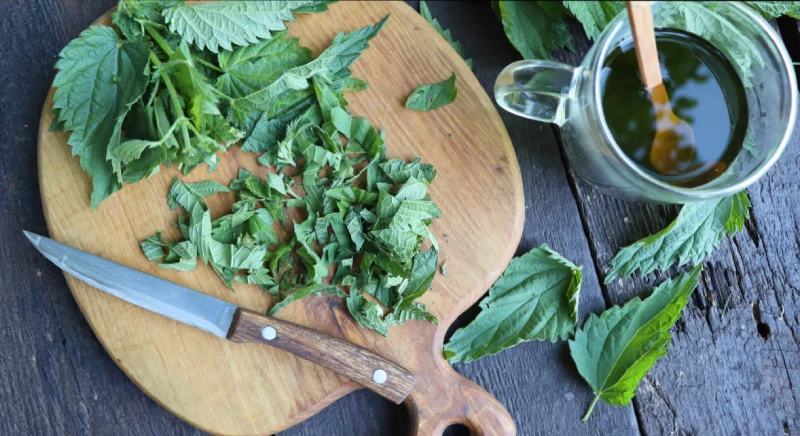Stinging nettle (Urtica dioica, Urtica urens, or Urtica radix) has been used medicinally for centuries and has several therapeutic benefits, including the relief of pain, treatment of urinary tract infection, reduction of enlarged prostate, and powerful antihistamine properties. Embracing stinging nettles for allergies can be a game-changer for your health, but it’s very crucial to approach its use thoughtfully to maximize the benefits while minimizing any potential drawbacks.

What Is Stinging Nettle for allergies?
Stinging nettle (Urtica dioica L.) is a herbaceous perennial plant that has been used for centuries due to its nutritional and potential health benefits. It is widely found in Europe, Asia, North Africa, and North America. The plant gets its name from the tiny hairs on its leaves and the stems that can cause a stinging sensation when touched. Despite this, stinging nettle has been included in various traditional practices.
Nettles are a fantastic source of iron, calcium, Vitamin C, folic acid, potassium, manganese, and carotenoids. Current research on using stinging nettle to support the management of allergies, specifically allergic rhinitis, has shown promising results. One double-blind study investigated the effects of stinging nettle and found that a dose of 150mg was able to help reduce the side effects associated with allergic rhinitis.
Research suggests that stinging nettle can help with symptoms of allergic rhinitis like sneezing, congestion, and a runny nose. It is believed that the plant’s properties help manage inflammation, which is one of its key benefits.
Nettles are a Nutrition Powerhouse
Nettles are also a rich source of vitamins A, B1, B2, B9 (folate), C, E, and K. In addition to containing vitamins, they are considered a rich source of minerals like calcium, potassium, phosphorus, magnesium, iron, and zinc. Heat will neutralize the stinging part of this plant so it can be consumed in a wide variety of recipes and teas. They are also used in a powdered or supplement form for a wide range of therapeutic treatments.
Natural sources of stinging Nettles
Stinging nettle can be widely found growing in the wild, particularly in moist, nutrient-rich soil. However, one should exercise great caution when harvesting nettle due to its stinging hairs. For those who prefer a much more convenient option, the stinging nettle supplements can be found in the health food stores and also bought online. It’s crucial to select the products from trustworthy sources to ensure the highest safety and efficacy. With the natural antihistamine properties, stinging nettle can also potentially ease the allergy symptoms caused by several plants, including ragweed, Johnson grass, and even invasive plants like nettle itself.
Nature’s Allergy Remedy
An allergic response occurs when the body comes into contact with an allergen. Special immune cells called mast cells release the chemical histamine, which binds to different histamine receptors, resulting in allergic responses. We are all familiar with those allergy signs and symptoms like a runny or stuffy nose, hives, and difficulty breathing. Nettles are used medicinally for many health conditions but are perhaps best known for treating the seasonal allergies. This plant serves as a natural antihistamine, blocking your body’s ability to produce histamine, a chemical that triggers allergy symptoms. Compounds have been found in nettles that help to combat the inflammation and reactivity of allergy sufferers.
5 Ways to Benefit from Nettles
Here are my recommendations for how to easily incorporate nettles into your favorite recipes:
- Drinking tea infused with nettle is a classic way to reap the benefits of this plant; purchase tea bags in the stores or make your own if you have the access to fresh leaves. Remember, processing the leaves with heat removes the stinging part of nettle leaves so they become safe to consume.
- Blend cooked nettles into sauces like pesto or use as a green in a red sauce on pasta or risotto.
- Simply sauté the nettle greens with garlic, olive oil, and lemon for a nutritious side dish.
- Try nettle soup for an antioxidant-rich summer dish. Add a little flavor with onion, potato, and vegetable stock.
- Add to scrambled eggs or omelets instead of spinach as an alternative green.
How to Use Stinging Nettle for Allergies?
Stinging nettle can be used for allergies in various forms like teas, capsules, tinctures, or topical creams or ointments. The method of use depends on an individual’s preference, but oral consumption is often the most common method for allergy relief.
How Can Stinging Nettle Prevent Allergy Symptoms?
Stinging nettle can help to prevent allergy symptoms by inhibiting the inflammatory events that cause hay fever symptoms. This herbaceous plant is believed to minimize the amount of histamine in the body, which is triggered by allergens like ragweed.
Nettle does this by inhibiting the entire process that our bodies employ to create the inflammation. When an allergen enters our body, it triggers an immune response that leads to the release of histamines, which can cause any sort of inflammation and other types of allergy symptoms. Stinging nettle’s natural antihistamine effect prevents all these symptoms from occurring.
It’s crucial to note that while stinging nettle might help to control allergy symptoms, it doesn’t cure the allergies. Allergies are actually an immune system response, and while we can always manage symptoms, we can’t eliminate the immune system’s reaction to the allergens. Therefore, stinging nettle should be used as part of the overall allergy management plan, which can include the avoidance of known allergens, use of other medicinal herbs, and a healthy lifestyle.
In conclusion
Stinging nettle is a very safe herb whenever used appropriately. If you want long-term relief from your allergies, Artemis Therapeutics can help. Pair nettle with complementary herbs for an extra health boost.
Keep a close watch on how your body responds, especially if you’re juggling conditions like high blood pressure or diabetes. Nettle is powerful — make sure it’s working harmoniously with your body.
Check out Artemis Therapeutics for high-quality natural allergy support designed to help you breathe better and live allergy-free!
